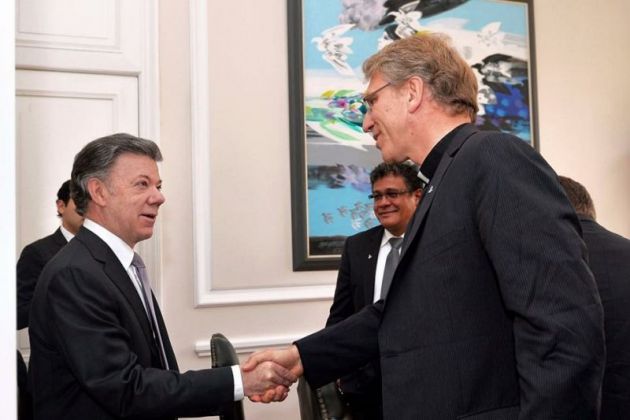Pope Francis' visit to Colombia hoped to boost peace process with rebels

Pope Francis has arrived in Colombia, his papal plane touching down in the military area of Bogotà's airport where a large delegation of Church and State authorities, including President Juan Manuel Santos, welcomed him with expecatations he can boost the country's peace process.
Much of Santos' presidency has been devoted to a peace agreement finalized in December with the Revolutionary Armed Forces of Colombia, or FARC, the largest of several mainly leftist rebel forces that have been at war with the government since the 1960s, The Los Angeles Times reported.
In the first formal speech, Pope Francis on Sept. 7 told government authorities that the key to eliminating conflict is to recognize the dignity of all people, especially the poor and marginalized, Catholic News Agency reported.
"I ask you, please, to listen to the poor, to those who suffer.
"Look them in the eye and let yourselves be continually questioned by their faces racked with pain and by their pleading hands. From them we learn true lessons about life, humanity and dignity," the Francis said..
Rather than a military honor guard usually greeting visiting heads of state, the Argentine pontiff was met Sept. 6 by scores of children from across Colombia.
Among them was 11-year-old Emmanuel Rojas, son of Clara Rojas, who was working as an aide to presidential candidate Ingrid Betancourt when they were both kidnapped by the FARC in 2002. Emmanuel was born during his mother's six-year captivity.
Vatican Radio's Linda Bordoni reported that a crowd of eager Colombian faithful was also there, waving flags, cheering and clapping to the rhythm of traditional music and dance.
Emmanuel Rojas hugged Francis and handed him a handcrafted ceramic dove, symbol of peace.
It is Pope Francis' 20th apostolic journey abroad and during his five-day visit he will take his message of reconciliation and hope to all Colombians as he visits the cities of Bogotà, Villavicencio, Medellin and Cartagena.
He will depart from Cartagena on Sunday September 10.
Before his departure in a video message the Pope said, "Peace is what Colombia has been looking for and working for for such a long time. A stable and lasting peace, so that we can see one another and treat one another as brothers, not as enemies."
Cardinal Ruben Salazar Gomez of Bogota is counting on Pope Francis' visit to assist Colombians to get involved in building peace by overcoming divisions, La Croix International reported.
TURNING THE PAGE ON WAR
"The country is preparing to turn the page on the war. This goes well beyond a simple ceasefire agreement or the demobilization of guerrilla forces," Cardinal Gomez told La Croix.
"The Pope will help us to make the compromises necessary for peace. He will give us very clear indications on how we are called to live out this period by uniting our forces."
He said, "All Colombians need to discover how to become personally involved in building this new phase."
Catholic humanitarian charity CAFOD has welcomed the pope's visit as Colombia deals with almost 60 years of internal armed conflict.
Clare Dixon, CAFOD's Head of Region for Latin America, told premier.org, "There is ongoing violence by the ELN and paramilitaries groups that continues to displace communities.
"In some parts of the country the conclusion of peace talks with the FARC and demobilisation of guerrilla members has created a power vacuum.
"Territory previously under influence of the FARC guerrillas is now being taken over by paramilitary groups and drug traffickers.
"We support community leaders and human rights defenders who are essential for achieving peace, yet despite the peace deal with the FARC, violence against them is increasing."

CAFOD said 51 human rights defenders were killed in the first six months of 2017, a 30 per cent increase from the same period in 2016.